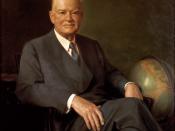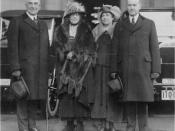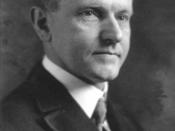All and all, Warren G. Harding had a very unlucky presidency, and turned out to be considered one of the least successful presidents in United States history. Calvin Coolidge however on the other hand managed to fit into the pro-business spirit of the 1920s extremely well. What made Coolidge a more worthy president was the fact that he favored government policies that would keep taxes down and business profits up, and give business more available credit in order to expand. Herbert Hoover, was elected in 1928 and it was visable that he was a disaster waiting to happen, even from the start.
After Harding was elected president in 1921, the American public desired for what he described as "normalcy", or in other words the simpler days before the Progressive Era and the Great War. Harding spoke great speeches of peace that comforted the healing nation. Even though this president had his good speeches, his judgement turned out to be very poor.
Following the beginning of his presidency, it was obvious to the American population that his politics and character would be tested
Greatly in the coming years. After WWI, problems arose relating to arms control, war debts, and the reconstruction of damaged countries. He invited many major powers to
the Washington Naval Conference to discuss the problems, even though Russia was left
out because they had a Communist government. At this conference, a major topic
of warships was discussed. His secretary of State urged that no more warships
be built for ten years and that the five major naval powers-United States, Great
Britain, Japan, France, and Italy eliminate many of their largest warships. At the
end of this conference, an amazing turn out was agreed, that the powerful
nations would disarm. Later on the Fordney-McCumber Tariff was created which
raised taxes on U.S. imports to 60%. After all this good doing, scandals hit
hard. The so called Ohio gang was a huge embarrassment, it was his president's
poker playing buddies. Something on a little bit bigger scale would be the
Teapot Dome scandal. The government had set aside oil-rich public lands at
Teapot Dome, Wyoming, and Elk Hills, California, for use by the U.S. Secretary
of the Interior Albert B. Fall, a close friend of various oil executives,
managed to get the oil reserves transferred from the navy to the Interior
Department. After a lot more of activity happening, he was found guilty of
bribery and became the first American to be convicted of a felony while holding
a cabinet position.
Coolidge is very well known the idea, "the chief business of the American people is business....The man who builds a factory builds a temple-the man who works there
worships there." His Republican successor, Herbert Hoover wanted to keep government interference in business to a minimum and to allow private enterprise to flourish. For most of the 1920s, this goal was working for them while the administration continued to place high tariffs on foreign imports which helped American manufacturers. Wages were also rising because of new technology, and so was productivity. He moved quickly to neutralize the effects of the Harding scandals, control the party machinery, and secure the 1924 presidential nomination for himself. His best achievements were the Dawes Plan for scaling down German reparations, the Stimson accords for pacifying Nicaragua, and the Kellogg-Briand Pact outlawing war. He remained a pretty good president except
that the Great Depression brought his policies into disrepute, and most people not regard him as having been overly complacent and inactive, lacking in vision, and ill equipped to deal with the period's emerging problems.
Hoover took over presidency in 1928 and economic disaster was around the
corner. He went against Democrat Alfred E. Smith with an overwhelming victory,
this was showing that Americans were content with Republican leadership. Hoover
had the biggest task out of these three president's because he had to deal with
the Great Depression. The Dow Jones Industrial Average was the most widely used
barometer of the stock market's health. The stocks were very big and important
to the people. In September 1929, stock prices peaked and then fell
drastically. Confidence of the people dropped, and investors quickly sold their
stocks. On October 24, it got worse and fell even more, more investors unloaded
their shares. On October 29, Black Tuesday arrived. The bottom fell out of the
market and of the nations confidence. The number of shares dumped was a record
16.4 million. Many people were stuck with debts as the prices plummeted. By
mid-November, investors had lost about $30 billion, this was equal to the amount
spent in World War 1. All of this was the beginning of the Great Depression,
the period from 1929 to 1940 where the economy was horrible and unemployment
skyrocketed.
These three presidents had very hard tasks, and that was just being the
president of the United States. That was hard enough for them and then with
these major events occurring it made it even harder. They did their best to run
the country but some of it wasn't entirely their fault. Some of the scandals
were but also some weren't. All three went down in history and its over now.


